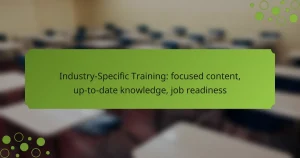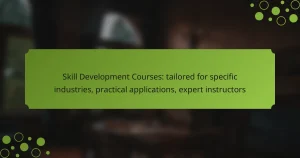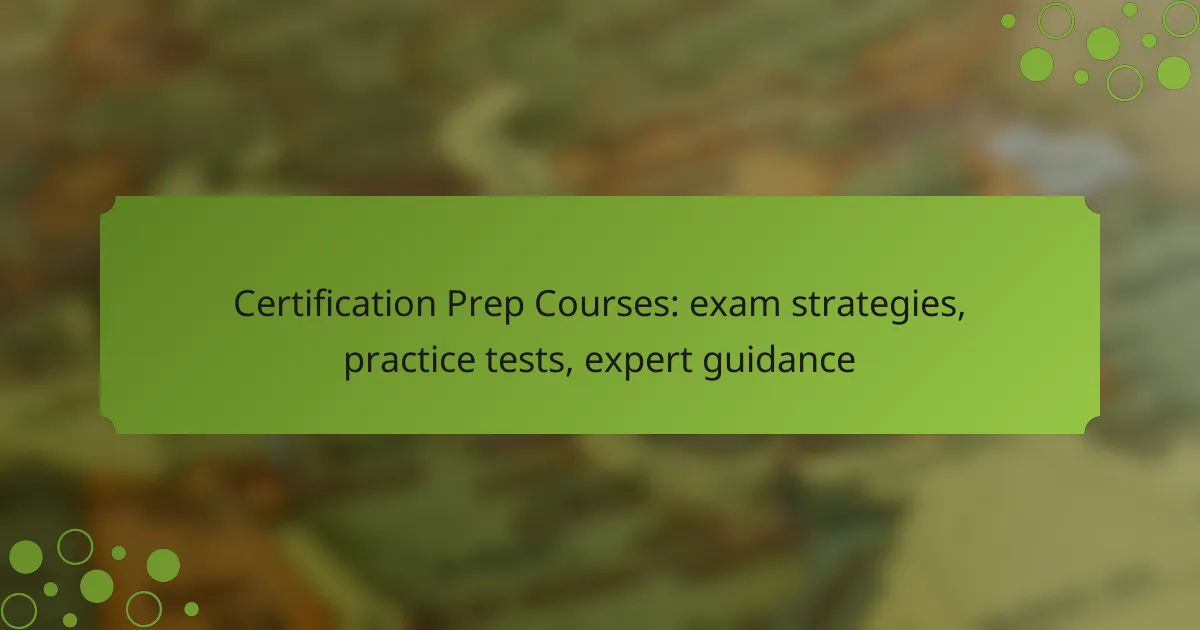
Certification prep courses are designed to equip candidates with effective exam strategies, practice tests, and expert guidance. By focusing on structured learning, these courses help individuals familiarize themselves with exam formats, improve their test-taking skills, and build confidence through targeted preparation. With personalized support and collaborative learning opportunities, candidates can enhance their understanding and retention of material, ultimately leading to improved exam performance.
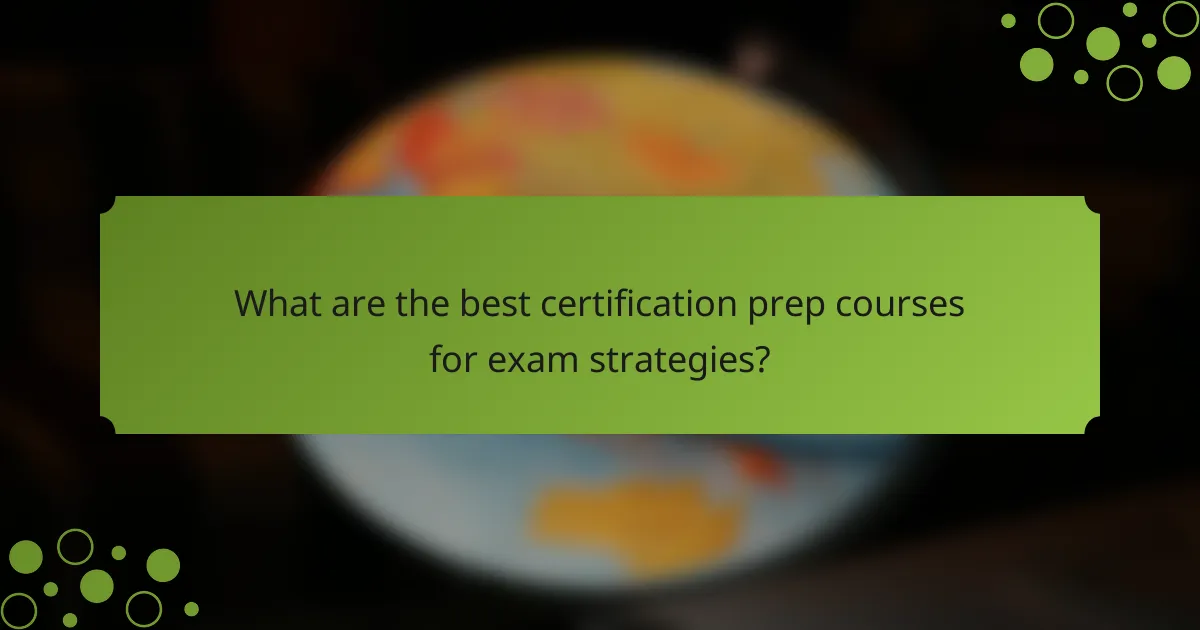
What are the best certification prep courses for exam strategies?
The best certification prep courses for exam strategies focus on structured learning, practice tests, and expert guidance. These courses help candidates understand exam formats, improve their test-taking skills, and build confidence through comprehensive preparation.
Coursera: Professional Certificate Programs
Coursera offers a variety of professional certificate programs designed to enhance exam strategies across multiple fields. These programs often include video lectures, quizzes, and peer-reviewed assignments that simulate real exam conditions.
When selecting a program, consider the course length and the level of interaction with instructors. Many courses provide access to forums where you can ask questions and share insights with peers, which can enhance your understanding and retention of the material.
Udemy: Exam Preparation Courses
Udemy features numerous exam preparation courses that cater to different certification needs. These courses typically include video content, practice questions, and downloadable resources to help reinforce learning.
Look for courses with high ratings and reviews from past students. Many instructors offer money-back guarantees if you don’t find the course helpful, which can reduce the risk of investment. Additionally, Udemy often runs sales, making these courses more affordable.
edX: Verified Certificates
edX provides verified certificate programs that focus on exam strategies for various certifications. These courses are developed by reputable universities and institutions, ensuring high-quality content and instruction.
Consider enrolling in courses that offer a blend of theoretical knowledge and practical application. edX courses often include assessments that mimic actual exam questions, helping you gauge your readiness. Keep an eye out for financial aid options if cost is a concern.
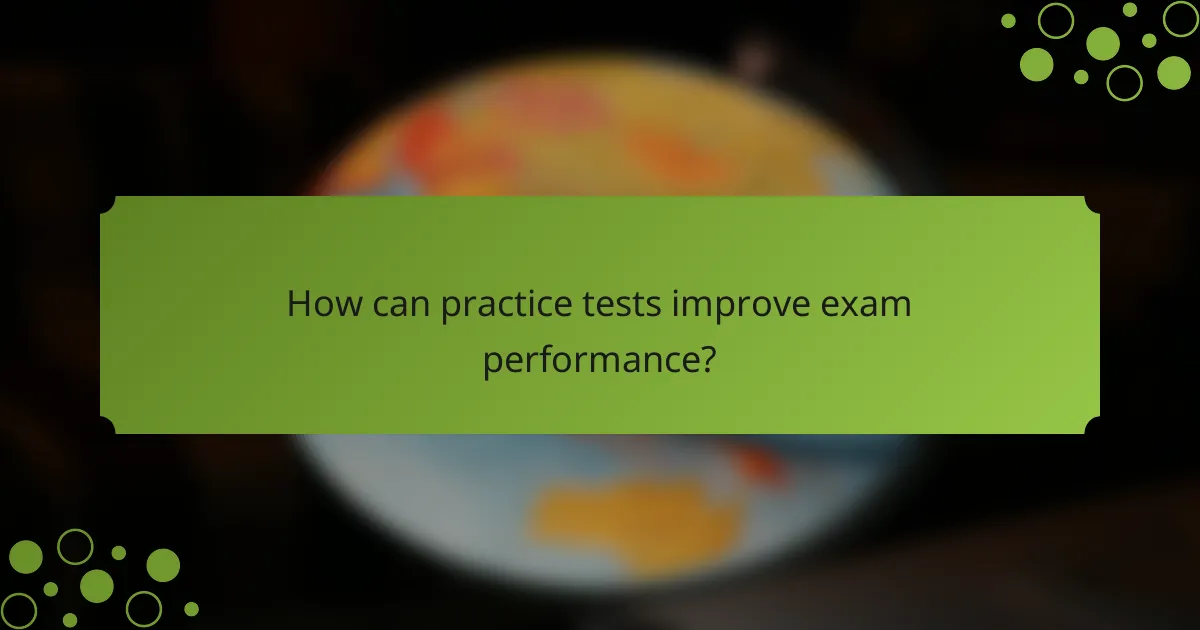
How can practice tests improve exam performance?
Practice tests can significantly enhance exam performance by familiarizing candidates with the exam format and types of questions they will encounter. They provide a structured way to assess knowledge and readiness, allowing individuals to identify areas needing improvement.
Simulates real exam conditions
Taking practice tests mimics the actual exam environment, helping candidates manage time and stress effectively. This simulation includes adhering to time limits and following the same protocols as the official exam, which can reduce anxiety on test day.
For example, if an exam is two hours long, a practice test should also be timed to match this duration. This approach helps candidates develop pacing strategies, ensuring they can complete all questions within the allotted time.
Identifies knowledge gaps
Practice tests are effective tools for pinpointing specific areas where candidates may lack understanding or knowledge. By reviewing results, individuals can see which topics they consistently struggle with and focus their study efforts accordingly.
For instance, if a candidate scores lower on questions related to a particular subject area, they can prioritize reviewing that material. Regularly taking practice tests can reveal trends in performance, guiding study sessions to be more efficient and targeted.
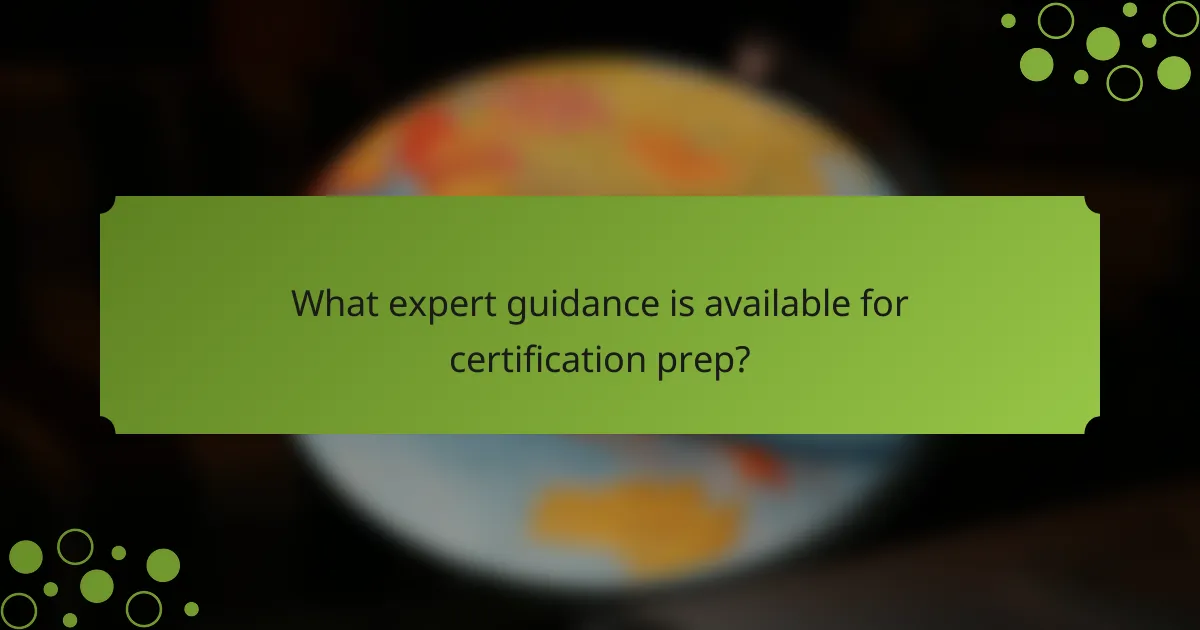
What expert guidance is available for certification prep?
Expert guidance for certification preparation includes personalized support and collaborative learning opportunities. This can significantly enhance understanding and retention of material, leading to better exam performance.
One-on-one tutoring services
One-on-one tutoring services provide tailored instruction based on individual learning needs. Tutors can focus on specific topics where the student struggles, offering personalized strategies and resources. This direct interaction allows for immediate feedback and clarification of complex concepts.
When selecting a tutor, consider their expertise in the specific certification area and their teaching style. Rates can vary widely, typically ranging from $30 to $150 per hour, depending on the tutor’s experience and qualifications.
Online study groups
Online study groups foster collaborative learning by connecting individuals preparing for the same certification. Participants can share resources, quiz each other, and discuss challenging topics, which can enhance understanding through peer interaction.
To maximize the benefits of study groups, choose platforms that facilitate easy communication, such as video calls or chat forums. Aim for groups of 4 to 8 members to ensure everyone can participate actively. Regular meetings, ideally weekly, can help maintain momentum and accountability.

What are effective exam strategies for success?
Effective exam strategies for success include thorough preparation, disciplined study habits, and the use of proven techniques to enhance retention and understanding. Implementing structured approaches can significantly improve performance on certification exams.
Time management techniques
Time management is crucial for exam success, allowing you to allocate sufficient time for each subject area. Break your study sessions into manageable blocks, typically ranging from 25 to 50 minutes, followed by short breaks to maintain focus and reduce fatigue.
Consider creating a study schedule that outlines daily and weekly goals. Use tools like calendars or apps to track your progress and adjust your plan as needed. Prioritize topics based on their difficulty and your familiarity with the material.
Active recall methods
Active recall is a powerful technique that involves testing yourself on the material rather than passively reviewing notes. This can be done through flashcards, practice tests, or teaching the concepts to someone else, which reinforces your understanding.
Incorporate spaced repetition into your study routine to enhance retention. Review material at increasing intervals, which helps solidify knowledge over time. Aim to revisit challenging topics multiple times before the exam to ensure they are well understood.
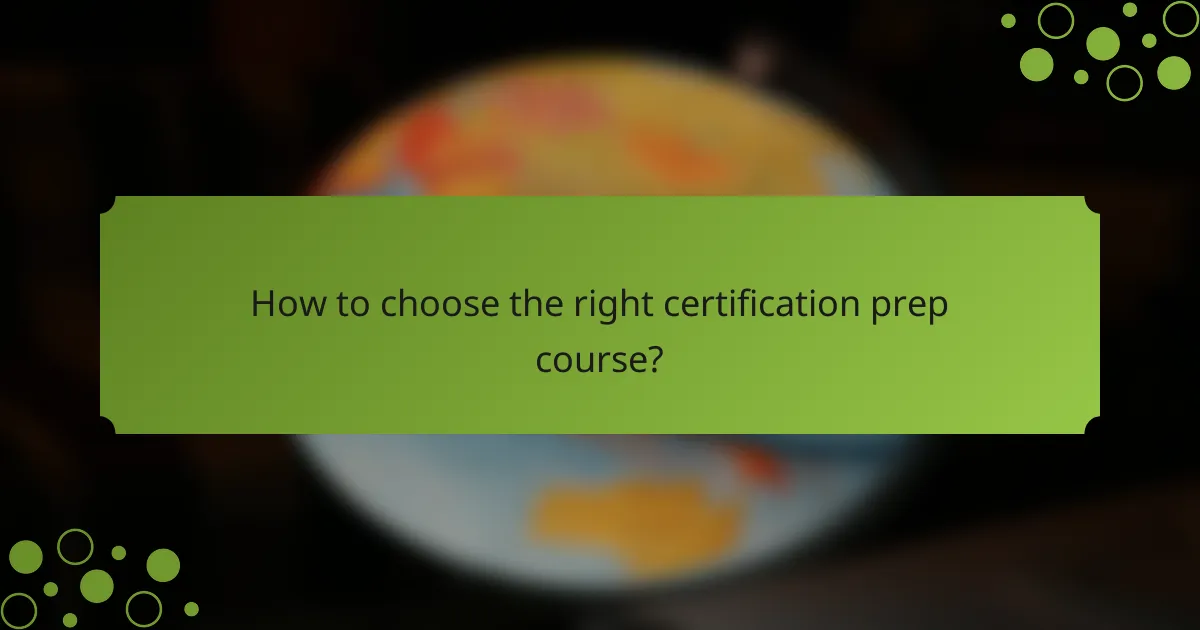
How to choose the right certification prep course?
Selecting the right certification prep course involves evaluating the course content, instructor qualifications, and how well they align with your learning goals. Consider factors like relevance to the certification exam, teaching experience, and student feedback to make an informed choice.
Assess course content relevance
When evaluating a certification prep course, ensure that the content directly aligns with the exam objectives. Review the syllabus and compare it with the official exam guide to confirm that all necessary topics are covered.
Look for courses that offer a mix of theoretical knowledge and practical application, as this approach often enhances understanding. Additionally, consider whether the course includes up-to-date materials, as certification requirements can change over time.
Check instructor qualifications
The qualifications of the instructor can significantly impact your learning experience. Investigate their professional background, including relevant certifications, teaching experience, and industry involvement, to gauge their expertise.
Seek courses where instructors have a proven track record of successfully preparing students for the certification exams. Reading reviews or testimonials from past students can provide insights into the instructor’s effectiveness and teaching style.
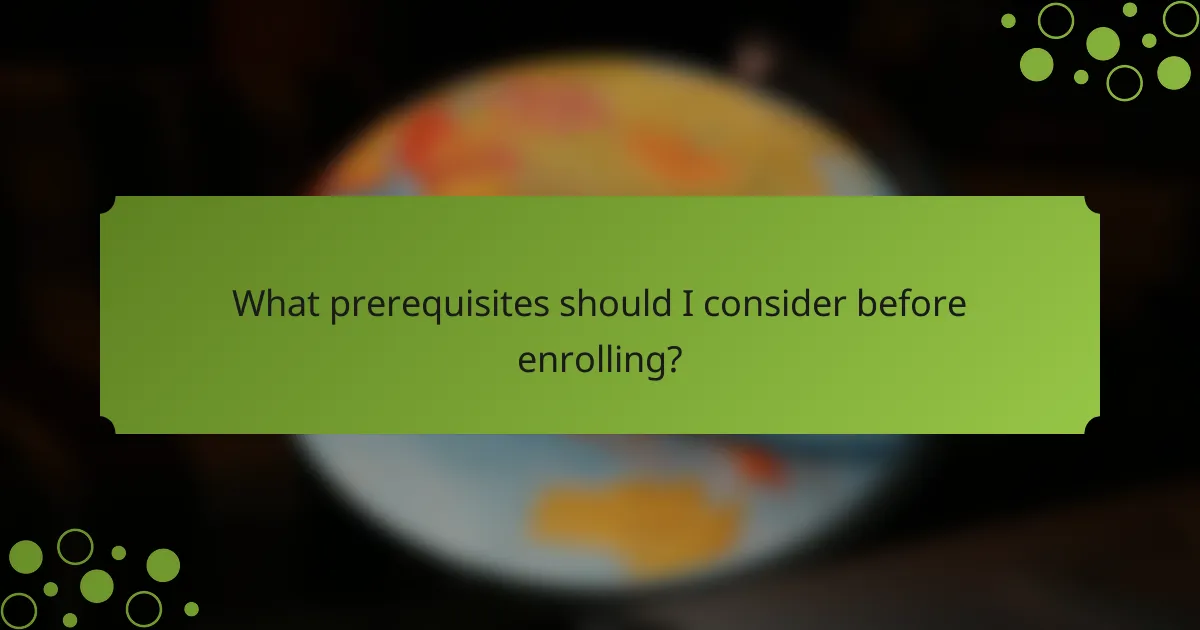
What prerequisites should I consider before enrolling?
Before enrolling in certification prep courses, consider your existing knowledge, the specific certification requirements, and the resources you will need. Understanding these prerequisites can help you choose the right course and maximize your chances of success.
Prior knowledge requirements
Many certification prep courses expect a certain level of foundational knowledge related to the subject matter. For example, if you’re pursuing a certification in IT, familiarity with basic networking concepts or programming may be essential. Assess your current skills and identify any gaps that need to be addressed before starting the course.
Some courses may offer introductory modules, while others may require you to have completed specific prior courses or hold certain qualifications. Review the course prerequisites carefully to ensure you meet them before enrolling.
Recommended study materials
To effectively prepare for certification exams, it’s crucial to gather the right study materials. Look for official study guides, textbooks, and online resources that align with the certification you are pursuing. Many organizations provide recommended reading lists or resources that can be beneficial.
Additionally, consider utilizing practice tests and online forums where you can discuss topics with peers. These resources can provide insights into exam formats and types of questions you may encounter. Always check for the latest materials to ensure you are studying the most current information relevant to your certification.
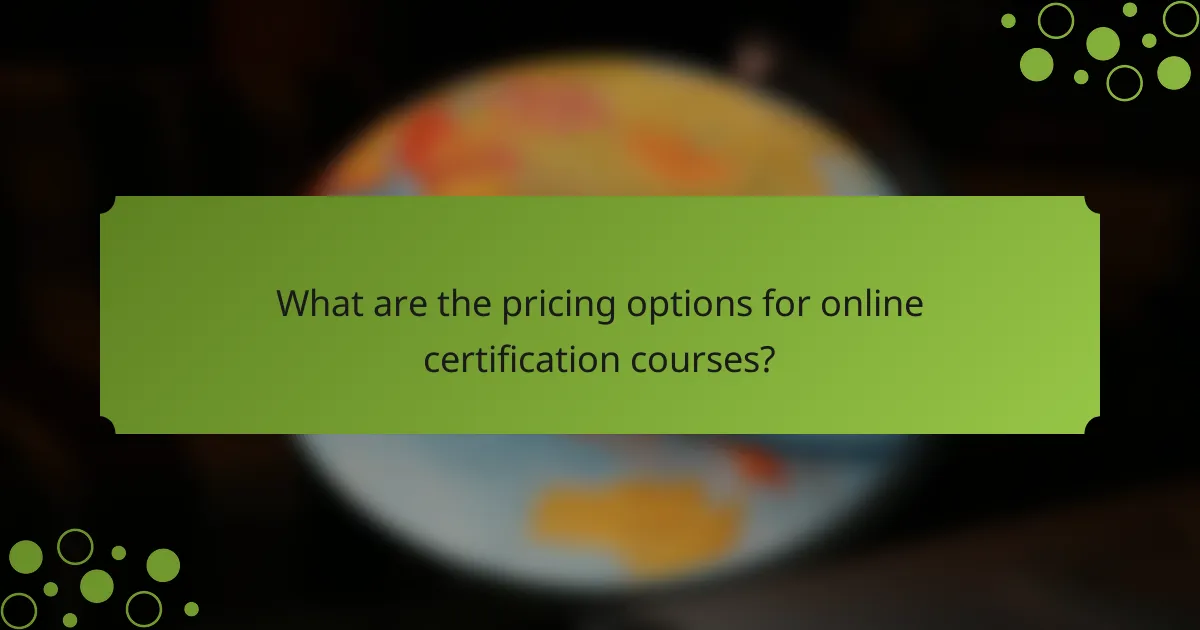
What are the pricing options for online certification courses?
Online certification courses typically offer various pricing options to accommodate different learning preferences and budgets. The two most common models are subscription-based payments and one-time course fees, each with its own advantages and considerations.
Subscription models
Subscription models allow learners to pay a recurring fee, often monthly or annually, to access a library of courses. This approach is beneficial for those who plan to take multiple courses over time, as it can be more cost-effective than paying for each course individually.
When considering a subscription, evaluate the number of courses you intend to take and the duration of access you require. Some platforms may offer introductory rates or discounts for longer commitments, so be sure to compare options before committing.
One-time payment courses
One-time payment courses require a single upfront fee for access to a specific course. This model is ideal for learners who prefer a focused study on a particular subject without ongoing financial commitments. Prices for these courses can vary widely, typically ranging from low tens to several hundred USD depending on the course depth and provider.
Before purchasing a one-time course, check for included resources, such as practice tests and expert guidance. Additionally, consider the refund policy in case the course does not meet your expectations, as some providers offer satisfaction guarantees or trial periods.
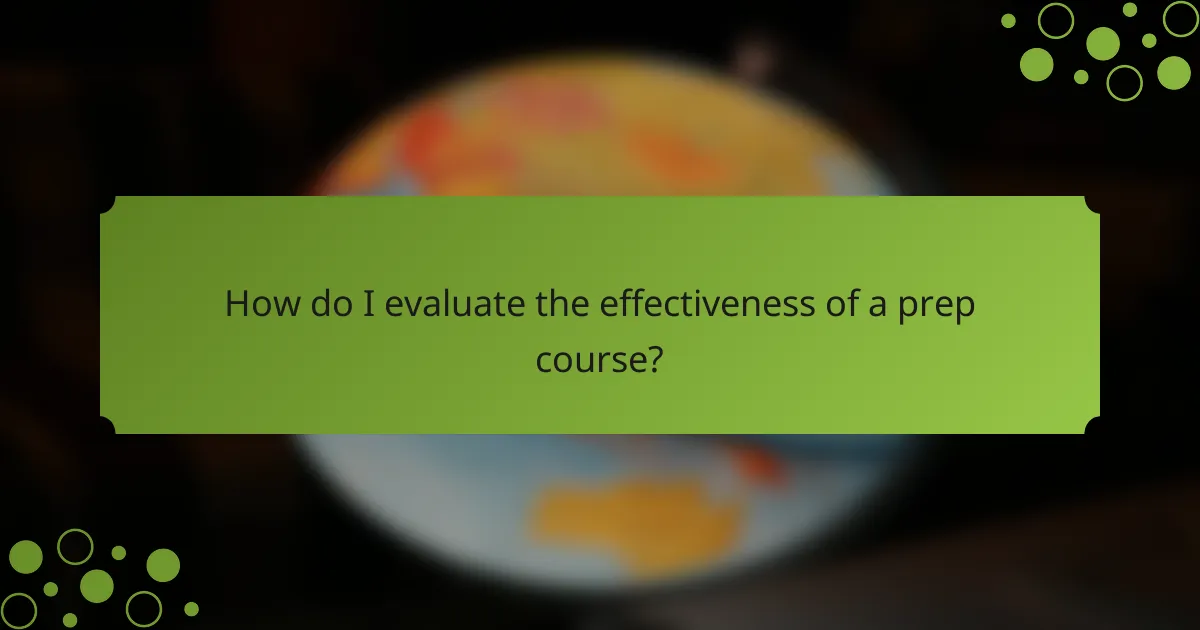
How do I evaluate the effectiveness of a prep course?
To evaluate the effectiveness of a prep course, consider factors such as course content, instructor qualifications, and student feedback. Look for courses that offer comprehensive materials, practice tests, and proven strategies tailored to the certification exam.
Course Content and Structure
Assess the course content to ensure it aligns with the exam objectives. A well-structured course should cover all relevant topics and provide a logical progression through the material. Look for courses that include a mix of theoretical knowledge and practical application.
Additionally, check if the course offers supplementary resources such as study guides, video lectures, and interactive quizzes. These elements can enhance understanding and retention of the material.
Instructor Qualifications
The qualifications of the instructor can significantly impact the effectiveness of a prep course. Look for instructors with relevant industry experience and a track record of successfully preparing students for the certification exam. Their expertise can provide valuable insights and tips that are not available in textbooks.
Consider reading reviews or testimonials from former students to gauge the instructor’s teaching style and effectiveness. A knowledgeable and engaging instructor can make a substantial difference in your learning experience.
Student Feedback and Success Rates
Student feedback is a crucial indicator of a prep course’s effectiveness. Look for reviews that highlight the strengths and weaknesses of the course, focusing on aspects like content clarity, engagement, and support. High satisfaction rates often correlate with better outcomes.
Additionally, inquire about the course’s success rates. A course that boasts a high percentage of students passing the certification exam can be a strong indicator of its effectiveness. However, consider the context, such as the average experience level of students enrolling in the course.

